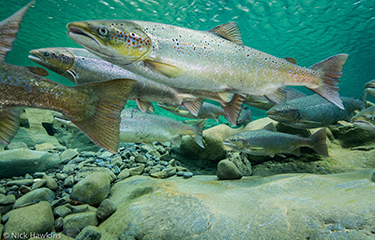Federal judge rules FDA must reevaluate effects of potential GE salmon escape

AquaBounty Technologies is facing another legal battle over its AquAdvantage salmon, as a California court ruled last week that the Food and Drug Administration (FDA) violated core environmental laws in approving genetically engineered salmon for sale and consumption.
On 5 November, a federal judge in San Francisco ruled the FDA ignored serious possible environmental consequences by approving genetically engineered salmon, and was also violating the National Environmental Policy Act. The judge also ruled the FDA approval was in violation of the Endangered Species Act, as the agency did not consult with the National Marine Fisheries Service and the Fish and Wildlife Service before taking an action that “may affect” a listed or endangered species.
The FDA must now return to its decision and more thoroughly analyze the environmental consequences of an escape of genetically engineered salmon into the wild. The court decision does not impact the current production or sale of GM salmon.
“The FDA did not, however, meaningfully analyze what might happen to normal salmon in the event the engineered salmon did survive and establish themselves in the wild. Even if this scenario was unlikely, the FDA was still required to assess the consequences of it coming to pass,” U.S. District Court of Northern California Judge Vince Chhabria wrote in his 16-page decision. “This is especially true because the FDA knew that the company’s salmon operations would likely grow, with additional facilities being used for farming. Obviously, as the company’s operations grow, so too does the risk of engineered salmon escaping.”
AquaBounty recently reported a strong balance sheet going into the fourth quarter of 2020 and announced that it had selected Mayfield, Kentucky, U.S.A., as its favored site for a future 10,000-metric-ton (MT) land-based salmon farm.
Opponents of the development and sale of genetically engineered salmon celebrated the new ruling.
"This decision underscores what scientists have been telling FDA for years – that creating genetically engineered salmon poses an unacceptable risk if the fish escape and interact with our wild salmon and that FDA must understand that risk to prevent harm," Earthjustice Managing Attorney Steve Mashuda said. "Our efforts should be focused on saving the wild salmon populations we already have – not manufacturing new species that pose yet another threat to their survival."
Center for Food Safety Legal Director George Kimbrell, who served as counsel on the genetically engineered salmon case, said the ruling is a “victory for endangered salmon and our oceans.”
"Genetically engineered animals create novel risks and regulators must rigorously analyze them using sound science, not stick their head in the sand as officials did here,” he said.
The Center for Food Safety and Earthjustice represent a coalition of environmental, consumer, and fishing groups in related cases.
In a statement, AquaBounty said it is unconcerned with the ruling. Its statement said the previous studies performed by the FDA were legitimate, expressed surety any new analysis will come to the same conclusion.
“While we were disappointed with some of the conclusions reached in the judge’s decision regarding the environmental assessment conducted by the U.S. Food and Drug Administration, we remain confident in the robust scientific studies and review that resulted in the 2015 FDA approval,” AquaBounty President and CEO Sylvia Wulf said. “This case did not call into question FDA’s approval regarding the health and safety of our AquAdvantage salmon. The focus of this decision was on the potential environmental impacts, and the judge confirmed the ‘low’ threat to the environment of our salmon.”
The company’s ongoing operations will not be affected, Wulf said.
“This decision will not have an impact on our on-going operations on Prince Edward Island, Canada, to produce eggs or in the raising and selling of AquAdvantage salmon from our farm in Indiana,” Wulf said. “We are committed to working with FDA on next steps and continue to evaluate the legal decision.”
Photo courtesy of Nick Hawakins/Ecology Action Center






Share